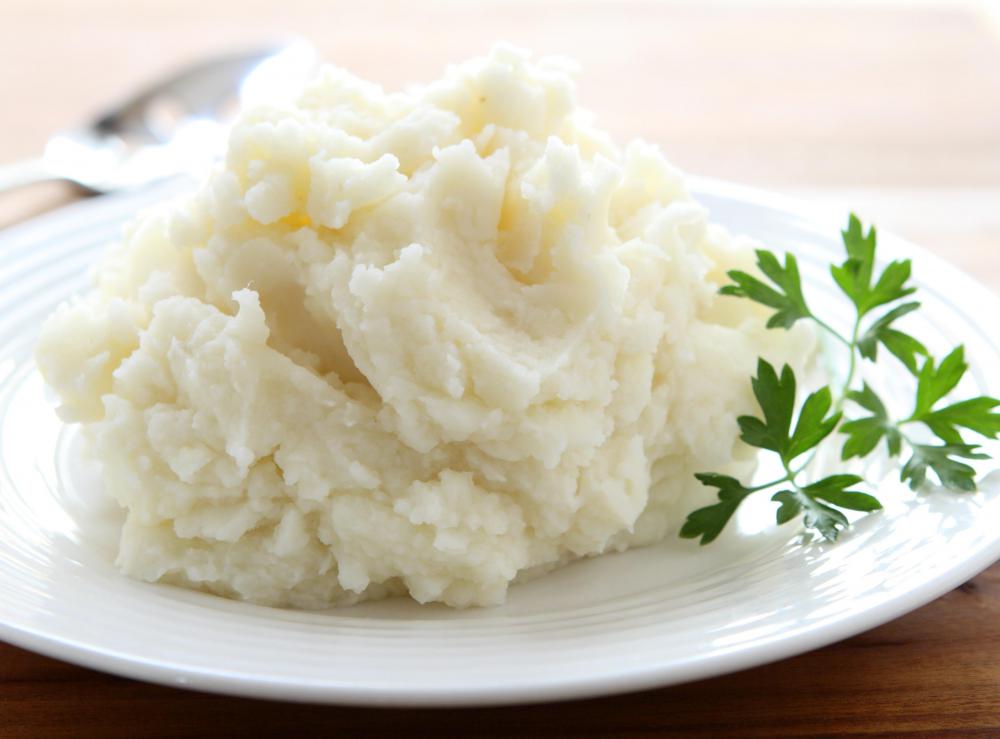At WiseGEEK, we're committed to delivering accurate, trustworthy information. Our expert-authored content is rigorously fact-checked and sourced from credible authorities. Discover how we uphold the highest standards in providing you with reliable knowledge.
What Are Crock-Pot® Mashed Potatoes?
Crock-Pot® mashed potatoes has two definitions. The first, and possibly more popular, version involves making mashed potatoes in a stew pot on the stove, then keeping them warm in a slow-cooker. Some cooks also make mashed potatoes the evening before a large dinner and place them in the slow-cooker the next day to reheat. The second version of Crock-Pot® mashed potatoes involves cooking the potatoes through in the slow cooker, mashing them, and returning them to the cooker to stay warm.
Many cooks like the first version of Crock-Pot® mashed potatoes because the recipe usually gives the cook more control over the taste and texture of the potatoes. The process involves boiling the potato cubes in a pot of boiling water on the stove until soft, draining, mashing, and scooping them into the slow cooker. Most cooks reserve a little of the starchy water from cooking the potato cubes. Adding this water to the Crock-Pot® mashed potatoes may help them from becoming dry and burning, especially if they will be simmering for a long time.

Reheating previously cooked mashed potatoes involves simply scooping the cold, cooked potatoes into the Crock-Pot®. Gently stirring and mashing the potatoes down into the pot helps them heat evenly. Cold mashed potatoes are usually a little harder and dryer than fresh, so a half-stick of butter, some milk, or a little water should restore the moisture lost during cooling. Butter and milk also generally make creamier, more flavorful potatoes.

When making the first version of Crock-Pot® mashed potatoes, many cooks wait until the potatoes go into the slow cooker to add sour cream, cream cheese, garlic, or other additional flavorings. The moist ingredients usually improve the potatoes’ texture. Prolonged heating also gives the herbs the chance to fully distribute their flavors throughout the dish.

The second kind of Crock-Pot® mashed potatoes may take a bit of practice for the home cook. It usually involves cubing the potatoes and adding them directly to the Crock-Pot® with enough chicken broth or salted water to just cover the cubes. Up to five hours on the high setting and seven hours on low should result in tender, but not mushy, potato pieces. The cook will still need to drain the potato pieces, but the potatoes may absorb most of the liquid. After draining, the Crock-Pot® mashed potatoes in this recipe may be mashed, seasoned, and returned to the slow-cooker.
One can usually avoid 'wallpaper paste' — overly thick and gluey mashed potatoes — or a too-runny version by choosing the right potato variety. Desirable potatoes will generally soften easily, while still holding their shape. Red potatoes, new white potatoes, and Yukon Gold potatoes are typically good choices.
AS FEATURED ON:
AS FEATURED ON:













Discuss this Article
Post your comments